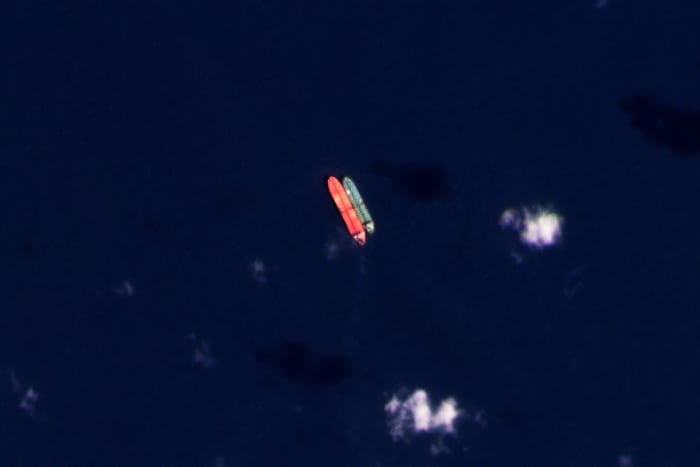DUBAI – A Greek shipper pleaded guilty to a charge of smuggling sanctioned crude oil from Iran and agreed to pay a $2.4 million fine, according to US federal court documents seen by The Associated Press on Thursday.
Empire Navigation agreed to probation under the plea agreement, according to documents filed in federal court.
The accusation stems from the saga around the Suez Rajan tanker, which has become mired in the wider tensions between the United States and the Islamic Republic, even as Tehran and Washington work to an exchange of billions of Iranian assets frozen in South Korea for the release of five Americans of Iranian origin detained in Tehran. Iran has been trying to evade sanctions and continue selling its oil abroad, while the United States and its allies have been seizing shipments since 2019 after the country’s nuclear deal allowing the trade failed.
Attention focused on the Suez Rajan from February 2022, when the group United Against Nuclear Iran said it suspected the tanker was carrying oil from the Iranian island of Kharghits main oil distribution terminal in the Persian Gulf.
For months, the ship lay in the South China Sea, off the northeast coast of Singapore, before suddenly heading for the Gulf of Mexico, without explanation. The vessel offloaded its cargo onto another tanker, which spilled its oil in Houston, Texas in recent days. Court documents viewed on Thursday confirm that the US government seized the oil.
Empire Navigation lawyer Apostolos Tourkantonis pleaded guilty to a single charge of violating Iran sanctions. Empire, based in Athens, Greece, did not immediately respond to a request for comment Thursday morning.
Mark Wallace, former US ambassador to the United Nations under President George W. Bush, who heads United Against Nuclear Iran, praised Empire Navigation for agreeing to the plea deal.
“They faced Iranian assassination threats in Greece,” Wallace told the AP. “They took the exit ramp to leave the crowd.”
Wallace declined to give further details, and US court documents offered no details of the alleged threat. However, the delay in offloading the Suez Rajan’s cargo had also become a political issue for the Biden administration, as the ship had been sitting in the Gulf of Mexico for months, possibly because companies were worried about it. the Iranian threat.
Since the Suez Rajan headed for America, Iran seized two oil tankers near the Strait of Hormuzincluding one carrying cargo for US oil major Chevron Corp. In July, the commander-in-chief of the Revolutionary Guards’ naval wing threatened further action against anyone unloading the Suez Rajan, with state media linking recent seizures to the fate of the cargo.
Iran continued to make threats over the seizure and summoned a Swiss diplomat to Tehran to express its anger. Switzerland has watched over American interests in Iran since the takeover of the American embassy and the hostage crisis in 1979.
Iran’s mission to the United Nations did not immediately respond to a request for comment.
In its 2015 nuclear deal with world powers, Iran regained the ability to openly sell its oil on the international market. But in 2018, President Donald Trump unilaterally pulled out of the deal and reimposed US sanctions. It slammed the door on much of Iran’s lucrative crude oil trade, a major driver of its economy and government. It has also launched a cat-and-mouse hunt for Iranian oil goods – as well as a series of escalating attacks attributed to Iran since 2019.
The United States Navy has steadily increased its presence in recent weeks in the Middle East, sending the USS Bataan, carrying troops and aircraft through the Strait of Hormuz and considering send armed personnel aboard commercial vessels crossing the strait to prevent Iran from seizing additional ships.
On Wednesday evening, the United States updated a warning to shippers traveling through the Middle East, warning: “Commercial vessels transiting the Persian Gulf, Strait of Hormuz and Gulf of Oman continue to be illegally boarded and detained or seized by Iranian forces. »
This year, however, Iranian oil exports have mostly topped 1 million barrels a day despite US sanctions, according to commodities data firm Kpler. In May and June, it exceeded 1.5 million barrels per day, with figures in August standing at 1.4 million barrels per day, according to data from Kpler. China is seen as a major buyer of Iranian oil, likely at a greatly discounted price.
“Justice has been served,” Wallace said. “At the same time, there needs to be a serious policy review on why it took so long and why 300 ships are doing the same thing.”
___
Find more AP coverage of the Middle East at https://apnews.com/hub/middle-east
Copyright 2023 The Associated Press. All rights reserved. This material may not be published, broadcast, rewritten or redistributed without permission.


